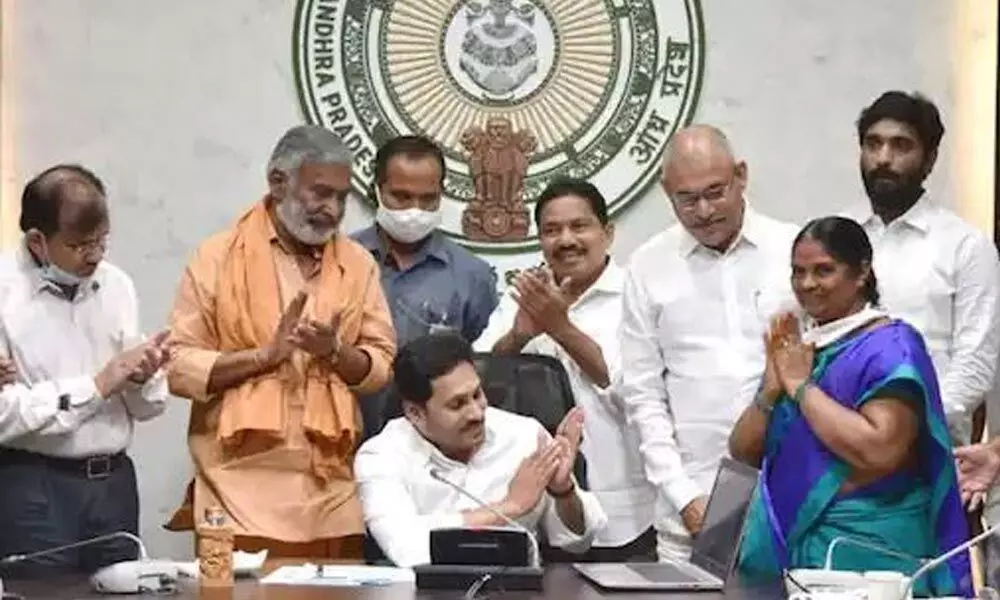Welfare sans empowerment pushes Andhra Pradesh to the brink

Welfare sans empowerment pushes Andhra Pradesh to the brink
- The State govt, which says it has spent over Rs 1 lakh cr on welfare schemes in the last 22 months, is finding it hard even to pay salaries to staff in time
- The debt has crossed Rs 3 lakh if the interest repayment of Rs 30,000 cr per year is also taken into account
Amaravati: Chief Minister YS Jagan Mohan Reddy approved welfare calendar for 2021-22 comes as a shocker to the well-wishers of the state. It cites that the 'Suvarna Adhyayam' or the golden era of Jagan's rule has so far spent from June 2019 to March 2021 just Rs 1,00,117.26 crore on both Direct Benefit Transfers to the people and non-DBT transfers.
Out of this amount, Rs 15,714.58 crore has gone to the non-DBT category and the rest has been made under the DBT.
However, what is worrying experts is the fact that the state's revenues are in bad shape. This residuary state, created in 2014 after a prolonged separate Telangana agitation, inherited a huge debt. Jagan Mohan Reddy inherited a minus Rs 65,000 crore exchequer when he came to power in 2019. At present, the debt burden is looming beyond the Rs 3 lakh figure factoring in the interest repayment of Rs 30,000 crore annually.
There are reports suggesting that the government is mulling sale of its land banks to shore up its revenues. Payment of salaries to the government employees itself had run into trouble this month.
Welfare measures are always welcome in this country as a huge population reels under poverty and due to lack of equal opportunities there is always this gap in the economy. However, there is a vast difference in attempting to eradicate poverty and making cash transfers to sustain the people.
The latest global formulation of Sustainable Development Goals lays emphasis on five Ps: People, Prosperity, Planet, Peace and Partnership. It recognises the need to adopt a holistic, integrated perspective on line and development, he said.
While inclusive growth should be the objective, making people living in rural areas an integral part of the developmental process should be the aim, as Vice-President, M Venkaiah Naidu, had pointed out in the past.
Agriculture should become viable, farm incomes should grow, the urban-rural divide should be reduced, empowerment of women, creation of employment opportunities, etc., are essential to ensure the development of the state.
Livelihoods have to be mainstreamed, market avenues for rural population and modernising agriculture are key to all these. Bottomline of development is improving the quality of life and it should be done through empowering people.
Creating a village volunteer system which just caters to the needs of the government in creating and sustaining vote banks by no way amounts to creating job opportunities. This is a government-specific programme and will be dumped the moment a new government takes over. In addition, none of the beneficiaries of the cash transfers could be called partners in development.
Handouts by the governments do not necessarily improve the economy of the state. The government must look at a different calendar, a timeline when it runs out of sources to fund the programmes and plunge the state into an abyss of complete economic collapse.














